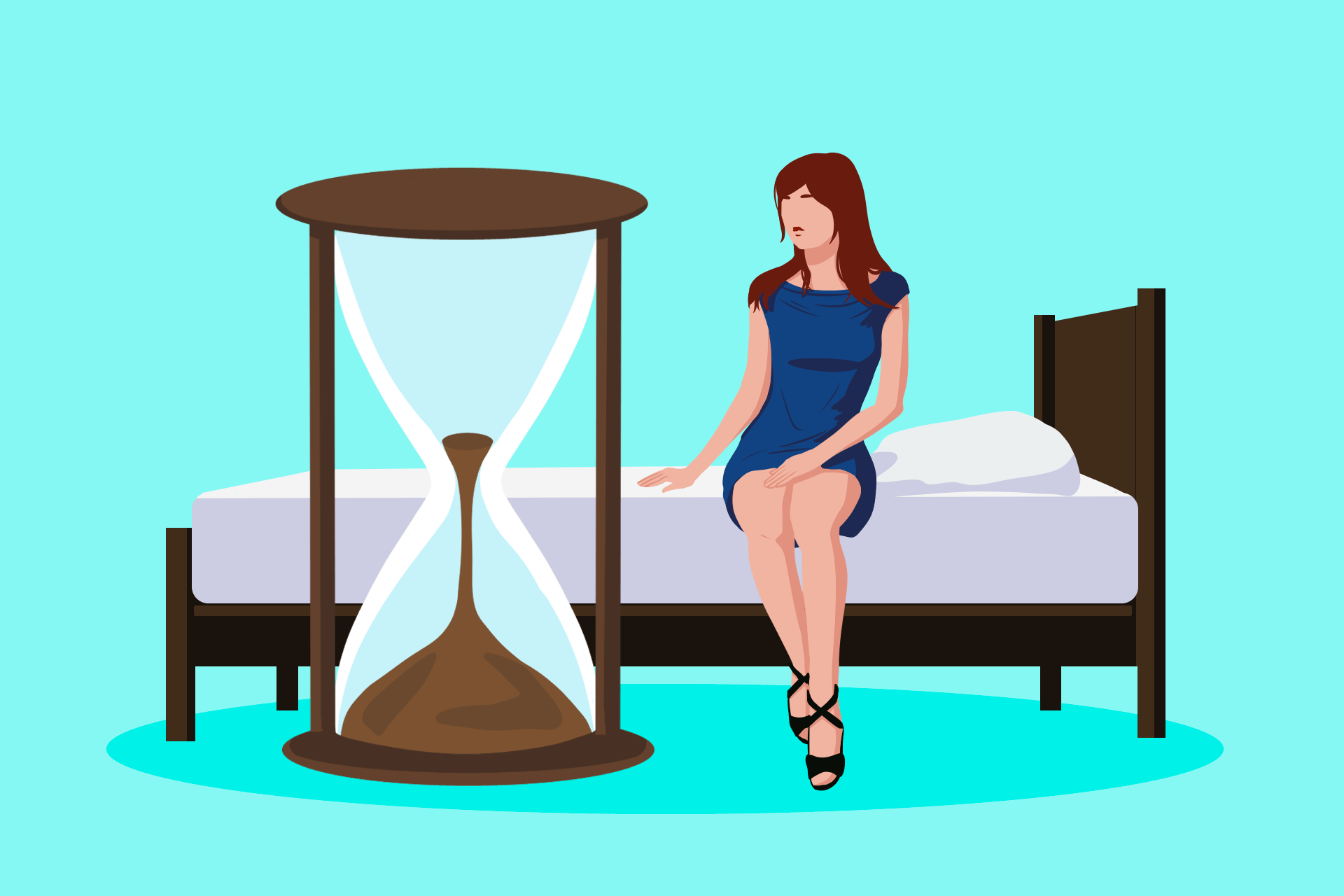Many people search online for “what does it mean to cum faster and is it bad to release faster?” Impressively, cumming too fast during sex is more common than most men realize, and it can happen at almost any stage of life. But is it normal? For some, it’s a one-off situation caused by excitement, stress, or not having sex for a while. For others, it becomes a recurring challenge that quietly destroys your confidence and creates unnecessary tension in relationships.

Many men worry that lasting only a short time in bed makes them “abnormal” or less satisfying as partners. However, the truth is that premature ejaculation is one of the most widespread sexual concerns worldwide.
Statistically, 40% of guys experience it at some point, and most never talk about it openly [1]. That silence can make the problem feel bigger than it really is. This guide explains why do men cum fast, breaks down what makes premature ejaculation occur during sex, and provides practical, proven strategies men can use to gain control and last longer during sex.
Table of Contents
What Does It Mean to “Cum Too Fast?”
“Coming too fast” usually refers to ejaculation that happens sooner than desired during sexual activity. Medically, this is known as premature ejaculation (PE). In simple terms, it means a boyfriend during intercourse reaches orgasm and ejaculates before he or his partner would like.
By one widely used definition, this occurs when orgasm happens very quickly, often within about one minute of penetration, and on nearly every sexual encounter [2]. But doctors also consider how much it bothers you. For example, if it happens only once in a while or after a long break from intimacy, it might not be PE at all [3].
On average, most couples have intercourse that lasts several minutes. The typical time from penetration to ejaculation is around 5–7 minutes. However, there is huge variability. Some men may finish in under a minute; others can go half an hour or more before climax [3].

Because of this range, only the most consistent and distressing cases count as true PE. In fact, while casual surveys often claim 20–30% of men ejaculate very fast, strict medical criteria (taking into account frequency and bother) suggest only about 4% of men meet the diagnosis [2].
In other words, occasional early ejaculation is normal, but if it happens nearly every time and causes stress, it’s considered “premature.”
Types of Premature Ejaculation?
PE isn’t one-size-fits-all. Doctors break it into lifelong (primary) and acquired (secondary) types. Lifelong PE means the man has always had the problem since his first sexual experiences. Typically, such men reach orgasm within one minute of penetration in most encounters. Acquired PE develops after a period of normal sexual control. A man with acquired PE might have had satisfying sex for years, then suddenly notices he’s climaxing much faster (often within about three minutes of penetration) [2].
PE can also be described situationally. Some men experience it globally—meaning virtually every time and with any partner or type of stimulation [2]. Natural variable PE describes a form of ejaculatory dysfunction where a man occasionally experiences rapid ejaculation under specific, situational circumstances but not consistently.
It’s considered a normal variation in ejaculation time, not a clinical disorder. This differs from lifelong PE (consistent rapid ejaculation) and acquired PE (developed later in life), and men with variable PE do not typically have normal or extended ejaculation times like those with premature-like ejaculatory dysfunction.
Others find it’s situational—for example, only with a new partner or when extremely excited. Moreover, experts sometimes note a “variable” type, which is essentially within normal variation, and a “premature-like dysfunction,” where a man feels out of control but actually has a normal ejaculation time [2].
For most practical purposes, though, you can think of PE simply as either lifelong or acquired, since that guides whether it likely has a long-term cause or something new has changed.
Some Reasons Why a Man Cums Too Quickly
There is no single cause of premature ejaculation. Instead, it usually involves multiple factors—both physical and psychological. Here are some common reasons experts cite, along with credible sources [2] [3]:
- high arousal or excitement. Being extremely turned on (for example, with a new partner or after a long break from sex) can make any man climax more quickly. This is often not pathological. In fact, health experts note that if ejaculation happens only on rare occasions (like when you’re especially excited or haven’t had sex in months), it’s usually normal. The body’s “ticking time bomb” can be triggered simply by novelty or pent-up energy;
- performance anxiety or stress. Worrying about your performance—fearing you won’t satisfy your partner or might lose your erection—can backfire. Many men report coming quickly when they feel nervous or self-conscious during sex. Anxiety fills the mind and reduces control over reflexes, leading to a rushed climax. Over time, this can become a vicious cycle: speed causes stress, which in turn induces more speed;
- relationship or emotional issues. Conflict or tension in a relationship can translate into sexual performance issues. If a man is upset about something (like doubts about the relationship or feeling unloved), that emotional turbulence can shorten the time to orgasm. In contrast, feeling deeply connected and relaxed with a partner often helps a man last longer, since intimacy can reduce selfish rushing;
- biological factors—hormones and neurotransmitters. Imbalances in the body can influence ejaculation speed. For example, low levels of the brain chemical serotonin are linked to quick climax (certain antidepressant medications like SSRIs raise serotonin and often slow ejaculation). Abnormal levels of hormones like prolactin, thyroid hormone (especially hyperthyroidism), or sex hormones (testosterone) have also been associated with PE. In fact, studies have found that men with an overactive thyroid often report premature ejaculation, and treating the thyroid problem can improve control;
- health conditions and medications. Some illnesses or treatments can cause PE. Inflammation or infection of the prostate or urethra (such as prostatitis) can irritate nerves and speed up ejaculation. Nervous system diseases—for example, multiple sclerosis or spinal cord injury—can damage the reflex pathways that regulate orgasm. Diabetes is known to cause nerve damage, which in rare cases may contribute to PE. On the medication front, certain drugs (like some for high blood pressure or depression) have ejaculation problems listed as side effects, though most commonly they delay rather than hasten climax;
- body image and confidence. Surprisingly, how a man feels about himself physically can play a role. Men who lack confidence or have poor body image (overall lack of confidence/poor body image) may rush through sex because they feel insecure;
- a big part of that worry is what a partner may think about specific body traits—and those imagined judgments can be wildly out of proportion to reality. For perspective on how body features are perceived and how varied sexual preferences really are, see what do men think about small boobs. Reading viewpoints like this can help reset expectations and reduce the anxiety that often speeds things up in bed. In fact, many men have positive attitudes about a variety of body types, including curves or flat chests—but focusing on these doubts can interfere with pleasure;
- general anxiety or depression. Chronic anxiety, panic disorders, or depression can affect sexual response. Emotional distress tends to accelerate orgasm for many men. In effect, persistent stress or sadness primes the nervous system to climax more quickly. Addressing underlying mental health (through therapy or stress reduction) often improves sexual control;
- new sexual partners or habits. Some men notice they ejaculate faster with a brand-new partner. The intense excitement and novelty (“new shoes!” effect) can propel things forward more quickly. Similarly, if a couple’s last sexual encounter was a long time ago, the very first intercourse might end quickly just due to strong arousal. Such once-in-a-while early ejaculations—for instance, if you “haven’t had sex in quite a long time”—are normal and not classified as PE.
In short, whether it’s adrenaline, anxiety, health, or hormones, often multiple reasons combine. Adrenaline can be a factor in PE, as it’s a stress hormone released during anxiety and arousal that can heighten sexual stimulation and lead to early orgasm. While not a direct cause in all cases, the surge of adrenaline that accompanies stress or nervousness during sexual activity can reduce control over the ejaculatory reflex, making PE more likely.

For some men, it truly is mainly psychological (nerves, relationship context). For others, a medical condition or even a past sexual trauma could be a factor. And for many, it’s simply a mix. The key is that ordinary variations in sex drive or excitement can make many men “come fast” at times. However, if it always happens in under a minute and causes distress, that’s when it’s considered a problem needing attention.
Useful Tips: How Men Do Not Ejaculate Quickly
If premature ejaculation is happening too often, some strategies and techniques can help. Here are some widely recommended methods:
- Practice Pelvic Floor (Kegel) exercises: Just like women, men have pelvic muscles that control ejaculation. Strengthening these muscles can delay climax. To do kegels, first identify the pelvic floor muscles (try stopping the urine mid-flow). Then repeatedly squeeze these muscles for 3–5 seconds and release, doing 10–15 repetitions in a row, three times a day. Over time, this builds control. In fact, one clinical study found that a 12-week pelvic floor training program enabled about 82% of men with lifelong PE to gain significantly better control over ejaculation [4]. The Mayo Clinic notes that weak pelvic floor muscles make delaying harder, so strengthening them helps significantly [5].
- Try the “stop–start” method: This simple technique involves pausing sexual stimulation right before you feel ready to ejaculate. For example, during intercourse or stimulation, as soon as you sense the point of no return approaching, stop all motion for 20–30 seconds. Let the arousal level subside, then continue. You can repeat this cycle several times before finally allowing orgasm. This pause-and-start process can train you to recognize your peak arousal and build endurance. Many sex therapists recommend it as an at-home drill, often along with foreplay during the pause.
- Use the “squeeze” technique: When you feel close to climax, gently but firmly squeeze the head (glans) of the penis where it joins the shaft. Keep the pressure for a few seconds until the urge to ejaculate passes, then release. This is known as the squeeze technique, and it interrupts the ejaculatory reflex. It may require practice (and may be done by a partner for convenience), but over time, it can help you learn to delay. Both the stop-start and squeeze methods have helped many couples improve timing [5].
- Strengthen your pelvic control between sessions: Masturbate about an hour or two before having sex. Some men find that if they climax in private first, the refractoriness (the brief period before you can climax again) allows them to last longer during partner sex. Be careful with timing: too long before, and you might not get fully hard again; too short before, and you may still be too sensitive. Experiment to find what timing (and technique) works best for you.
- Focus on foreplay and partner intimacy: Shifting attention from the goal of penetration to the overall experience can reduce pressure. Spend extra time on kissing, touching, oral sex, or manual stimulation. This not only increases your partner’s pleasure but also helps you relax. It can also trigger a natural refractory delay for you. For example, couples sometimes discover that focusing on unique and sensual aspects of each other’s bodies, even something playful like admiring a partner’s long nipples, can lighten the mood. Discussing affectionately or teasing about each other’s features (like what you love about each other’s bodies—even what other men think about small breasts) keeps things playful, distracts from performance anxiety, and can help you stay calm.
- Use condoms or desensitizing products: Physical factors matter too. A snug or thicker condom can reduce sensation, helping you last longer. There are also “climax control” condoms and lubricants with mild numbing agents (like benzocaine or lidocaine) that slightly desensitize the penis. Specially coated condoms or creams can delay ejaculation by making the head of the penis less sensitive. (Always test such products ahead of time and discuss with your partner to avoid allergies.)
- Practice mindful breathing and slow down. When you feel arousal building, try taking slow, deep breaths. Slow down thrusting or stimulation, focusing on the sensation rather than pushing harder. Gentle pause-and-breathe moments can reset your rhythm. Over time, this mindfulness can become natural and reduce the “velocity” of arousal.
- Communicate with your partner. Openly talking about the issue can relieve stress. Many couples find it helpful to explain to their partner what’s happening so they don’t feel rejected. Work together as a team: for instance, your partner can help with pause/squeeze, or focus on her own pleasure first. When both partners engage and support each other, the pressure on you to “perform” decreases. Sexual intimacy often improves when couples face PE together. It’s achieved by fostering open communication, emotional connection, and a shared problem-solving approach. This strengthens the relationship bond and allows couples to work towards a solution that addresses both partners’ needs and desires.
- Seek professional help if needed. If self-help techniques aren’t enough, consider seeing a healthcare provider or sex therapist. They can rule out any medical issues (like hormone imbalances or prostatitis) and recommend treatment. In some cases, short-term use of medications might be discussed. For example, doctors sometimes prescribe low-dose antidepressants (SSRIs) off-label to delay ejaculation or topical creams on the penis. There’s also medication like dapoxetine in some countries (designed just for PE) and even tools like pelvic muscle biofeedback. Psychological counseling (especially cognitive behavioral therapy) can address underlying anxiety or relationship problems. Remember: seeking help is common and can dramatically improve confidence and control.
- Maintain general health. Healthy habits indirectly help sexual stamina. Regular exercise improves cardiovascular health and endurance (good blood flow supports sustained erections and ejaculatory control). Avoid excessive alcohol and drugs (which can disrupt normal sexual function). Control chronic conditions: for instance, men with diabetes should manage their blood sugar, as nerve health can affect ejaculation. Even simple things like getting enough sleep and reducing daily stress give you better overall control. Diet plays a subtle role in hormone regulation. A balanced intake of proteins, healthy fats, and micronutrients from foods such as nuts, seeds, and leafy greens can support testosterone and serotonin levels, both of which influence ejaculatory control. Improve your overall health through exercise and nutrition. Foods rich in zinc and magnesium—like nuts, seafood, and whole grains—are linked to better reproductive health and may support sexual stamina.

Each man is different, so it may take some experimentation to find which tips work best. Importantly, many of these methods complement each other—combining pelvic exercises, breathing techniques, and communication often yields better results than any single tip alone.
Final Thoughts
Premature ejaculation—or “coming too fast”—may feel embarrassing, but it’s very common and treatable. First, recognize that it is not a moral failing or a sign of weakness. Thousands of men experience it and improve with time and help. The key is understanding that it often has underlying causes: from simple excitement to anxiety to biological factors. By learning about these causes and applying practical techniques, many men can dramatically increase their control.
Remember the core message: it usually takes time and practice. Just as you wouldn’t expect to master tennis in one game, it can take weeks of exercises and open communication to build sexual confidence. Don’t hesitate to involve your partner—a supportive attitude and mutual exploration can turn a stressful issue into a shared project that brings you closer. If worries persist, be open to professional advice; urologists, therapists, and sexual medicine specialists have many effective tools. Even small changes, such as staying active, lowering stress, or adding nutrient-rich foods like nuts to your diet, can contribute to sexual well-being alongside medical or behavioral treatments.
Ultimately, “lasting longer” often comes from reducing pressure on yourself. Focus on pleasure, connection, and having enjoyment. When the emphasis is on intimacy rather than a clock, sex can become more satisfying for both partners. With patience and the right approach (as reviewed here and in medical resources), most men can overcome premature ejaculation and enjoy a more relaxed, rewarding sex life.
References:
- Premature Ejaculation. Retrieved: September 11, 2025. My.clevelandclinic.org.
- Premature Ejaculation. By Marissa Crowdis, Stephen W. Leslie, and Saad Nazir. Published: May 30, 2023. Pubmed.ncbi.nlm.nih.gov.
- Overview: Premature ejaculation. Retrieved: September 11, 2025. Ncbi.nlm.nih.gov
- Pelvic floor muscle rehabilitation for patients with lifelong premature ejaculation: a novel therapeutic approach. By Antonio L. Pastore, Giovanni Palleschi, Andrea Fuschi, et al. Retrieved: September 11, 2025. Pmc.ncbi.nlm.nih.gov.
- Premature ejaculation. By Mayo Clinic Staff. Retrieved: September 11, 2025. Mayoclinic.org.